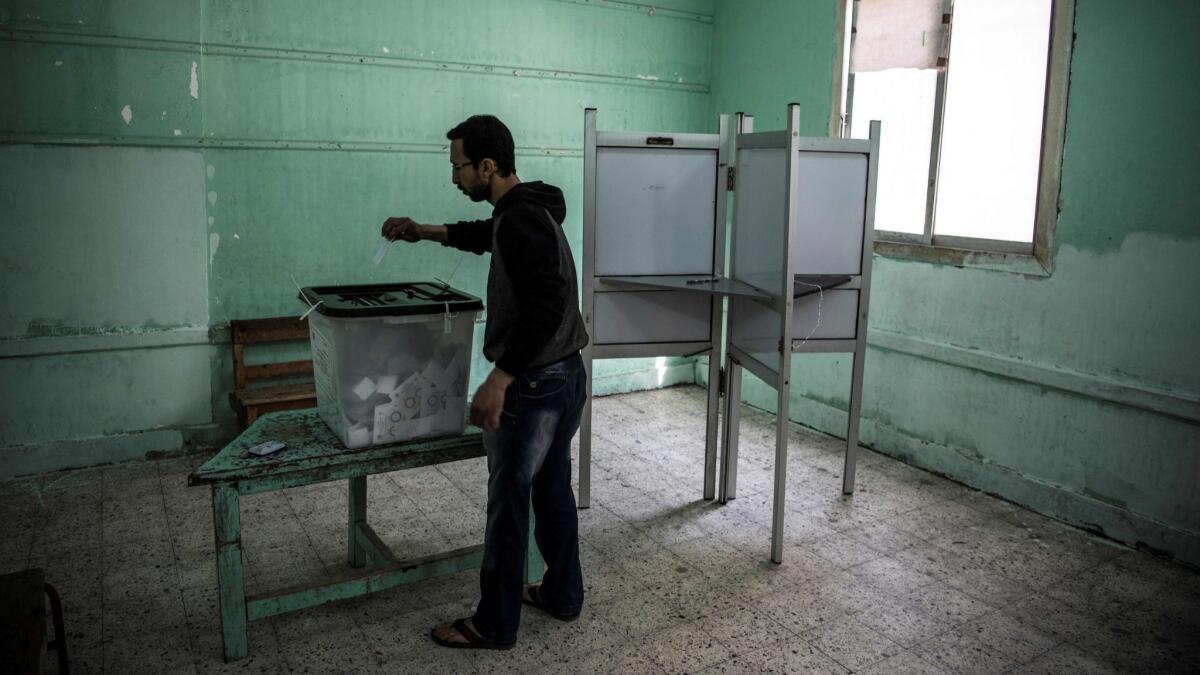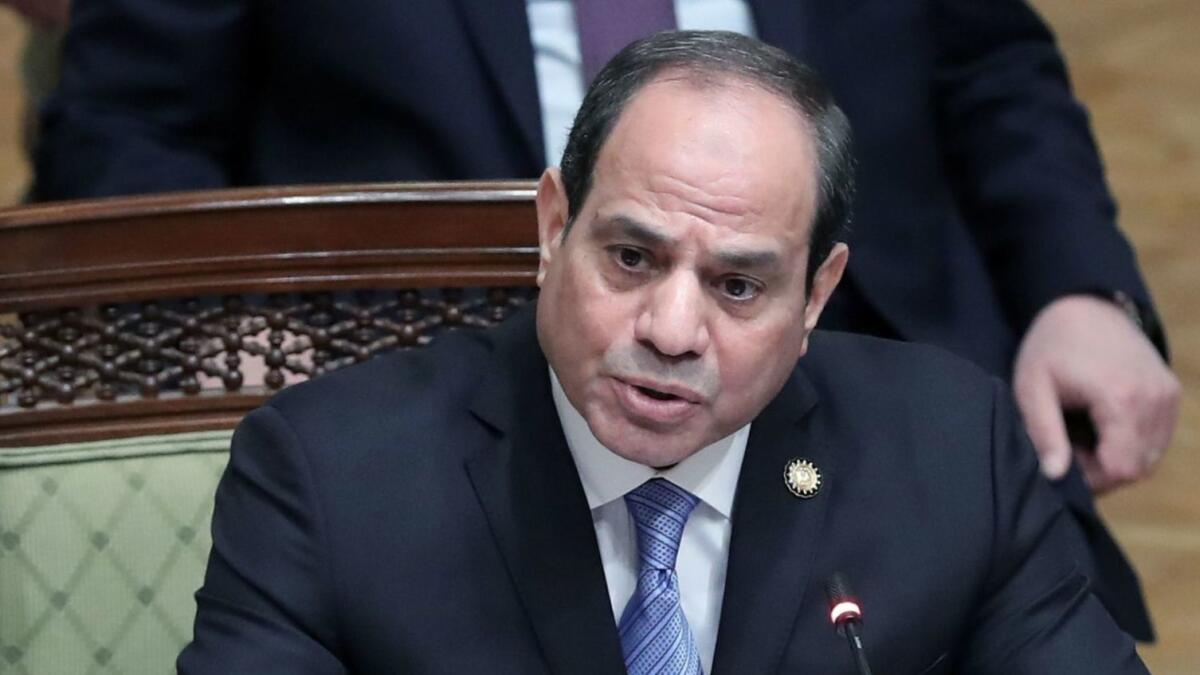Egypt amends constitution to further the power of an increasingly autocratic president

- Share via
Reporting from Cairo — In a widely expected outcome, Egyptians have voted to amend their constitution to bolster President Abdel Fattah Sisi’s power and pave the way for the increasingly autocratic former general to stay in office until 2030, according to official results announced Tuesday evening.
Some 23.4 million Egyptians, 89% of those who voted in a three-day referendum that ended Monday, opted to give Sisi greater control over the judiciary, Egypt’s National Election Authority announced. The authority said about 44% of Egypt’s eligible voters turned out for the referendum.
The changes pushed by Sisi — first elected in 2014 after heading a military coup against a democratically chosen leader — also embed the military in state affairs by giving it power to “protect the constitution and democracy.”
The constitutional amendments extend Sisi’s current four-year term, which was supposed to be his final term ending in 2022, by two years and allow him to run for an additional six-year term that would end in 2030.
There is also a new 25% quota for women in parliament and a second chamber in parliament, an upper house that will have one-third of its members appointed by the president.
The speaker of Parliament, Ali Abdel Aal, has said the constitution could be changed yet again within the next decade.
Term limits? Egypt’s Sisi may have found a way around that roadblock »
Sisi said Tuesday night that he paid “tribute to the Egyptian people who impressed the world.” In a written statement, he lauded voters’ “genius” in taking part in the referendum “in the exercise of their political and constitutional right.”
For opponents, the changes to the 2014 constitution are an assault on the key principles of a 2011 uprising, in which the military dictatorship of Hosni Mubarak was toppled by popular protest.
The freedoms gained in the revolution have been rolled back under Sisi, and rights groups say he has presided over a crackdown more severe than anything the country experienced under Mubarak.
“What we are witnessing is a referendum that is indicative of a system being built to keep a single man with centralized authority in power for life,” said Tarek Radwan, a Cairo-based independent researcher who was formerly with the Atlantic Council.
Few Egyptians were surprised by the results.
“We already knew it was going to be a yes,” said a 27-year-old flight attendant in downtown Cairo who was on his way to work at the airport and said he was “too busy” to vote.
“I don’t like Sisi,” said the man, who asked not to be named for fear of reprisals. “I think he’s not good as a president at all.”
A cobbler who supported Sisi said he voted yes, adding that he wasn’t sure whether the future looked good, but that he was “trying to be positive.”
“Sisi’s doing a lot of good projects, but he’s putting a lot of economic pressure on us,” said 43-year-old Sayeed Faruk. He was referring to planned cuts in fuel subsidies and past cuts in food and energy subsidies. The reductions and rising prices have hit most ordinary Egyptians.

The referendum came just 72 hours after Egypt’s Parliament, packed with Sisi loyalists, overwhelmingly voted for the constitutional changes. Critics decried how little time Egyptians were given to read and understand the proposals they were to be voting on.
There were widespread reports of voters being given food boxes to cast their ballots, or of being given transport to the polls, both of which Egypt’s State Information Service denied.
“The state would not resort to such individual practices to influence voters,” it said. The National Election Authority said it had not received any such reports.
In the working class district of Dar el Salam, however, several voters confirmed they were getting food boxes to cast their ballot. One recent graduate of a petroleum institute showed the contents of her white cardboard food box after she had collected it from the mosque after voting. It contained rice, pasta, sugar, oil and margarine.
Radwan, the Cairo-based researcher, said before the official results were announced that the accuracy of vote totals would be difficult to assess, in part because of “the complete lack of independent monitoring.”
“With a disillusioned and marginalized public that has to be coerced or bribed into participating in the referendum and the overwhelming public indifference that has surrendered to military supremacy in public life, I would be suspicious of NEA figures that do not reflect low turnout and high acceptance rates,” he added.
The Civil Democratic Movement, a coalition of secular and left-leaning political parties, had tried to mount an opposition campaign to urge Egyptians to vote “no,” but said its ability to do so was heavily stifled by the authorities.
The referendum has been frustrating, said Mohamed Anwar Sadat, one of the movement’s members and a namesake and nephew of the former president
“We have to live with it,” he said, “and think of tomorrow.”
Amy Hawthorne, research director at the Project on Middle East Democracy, warned that “the constitutional amendments represent yet more seeds of instability for Egypt.”
“As recent events in Sudan and Algeria have shown, military dictatorships more often than not fail to create lasting stability and prosperity, and citizens in highly repressive countries can sometimes manage to mobilize against autocrats and remove them from office,” Hawthorne said.
The presidents of Sudan and Algeria were removed this month after popular protests, although in both cases the protesters ultimately had military backing.
“Sisi, of course, is betting that he will be an exception to this trend, and he expects that by tightening control, he and the military can rule over Egypt indefinitely, regardless of what Egyptians want,” she said.
ALSO:
He thought he was going to work. More than 5 years later, the photojournalist gets out of jail
From her atelier in Cairo, she dresses belly dancers from around the world
In a vast, dust-swept landscape, Islamic State caliphate ends in rubble and wreckage
Islam is a special correspondent.
More to Read
Sign up for Essential California
The most important California stories and recommendations in your inbox every morning.
You may occasionally receive promotional content from the Los Angeles Times.










